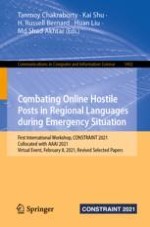2021 | OriginalPaper | Buchkapitel
Transformer-Based Language Model Fine-Tuning Methods for COVID-19 Fake News Detection
verfasst von : Ben Chen, Bin Chen, Dehong Gao, Qijin Chen, Chengfu Huo, Xiaonan Meng, Weijun Ren, Yang Zhou
Erschienen in: Combating Online Hostile Posts in Regional Languages during Emergency Situation
Aktivieren Sie unsere intelligente Suche, um passende Fachinhalte oder Patente zu finden.
Wählen Sie Textabschnitte aus um mit Künstlicher Intelligenz passenden Patente zu finden. powered by
Markieren Sie Textabschnitte, um KI-gestützt weitere passende Inhalte zu finden. powered by
